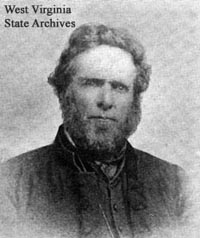

Chapter Eleven
West Virginia Constitutional Convention
1861-1863


1861-1863
Although the voters had approved the creation of "Kanawha," many delegates were opposed to the name. Opposition to Kanawha came from the fact that a county and two rivers already had that name. United States Senator Waitman T. Willey, who was in attendance, drew laughter when he stated that some of his constituents found it difficult to spell. Willey added, "I have no objection to any name that is convenient, though I will say that in this case I think the rose would smell sweeter by some other name." A lengthy debate ensued as to the best name for the new state. A number of delegates spoke strongly either in favor of or against the inclusion of "Virginia" in the new state name. Eventually, "West Virginia" was selected.
Determining the boundaries of the new state was a difficult issue. The Committee on Boundary proposed that an additional thirty-two counties be added to the thirty-nine already included. Debates ensued, and a number of proposed counties were rejected, some due to large numbers of slaves, secession sentiment, or debt. On December 13, the convention determined that West Virginia would include the thirty-nine original counties and five additional. Also, seven more counties would be added if their voters approved.
| Slavery was an issue that hung over the convention. On November 30, 1861, Robert Hagar of Boone County called for a free state and proposed gradual emancipation. Gordon Battelle of Ohio County, a Methodist minister, proposed forbidding additional slaves from entering the state and gradual emancipation for slaves in the new state. Battelle pressed for gradual emancipation, but was unable to convince a majority of delegates to support its inclusion in the constitution. The finished document simply stated, "No slave shall be brought, or free person of color be permitted to come into this State for permanent residence." |
 |
Slight changes were also made to the structure of government. Probably the most controversial change was the introduction of the township system to replace the Virginia county court system.
The new constitution was approved in a unanimous vote by the delegates on February 18, 1862. It was then submitted to the voters of West Virginia, who, on April 3, overwhelming approved the constitution, 18,862 to 514.
